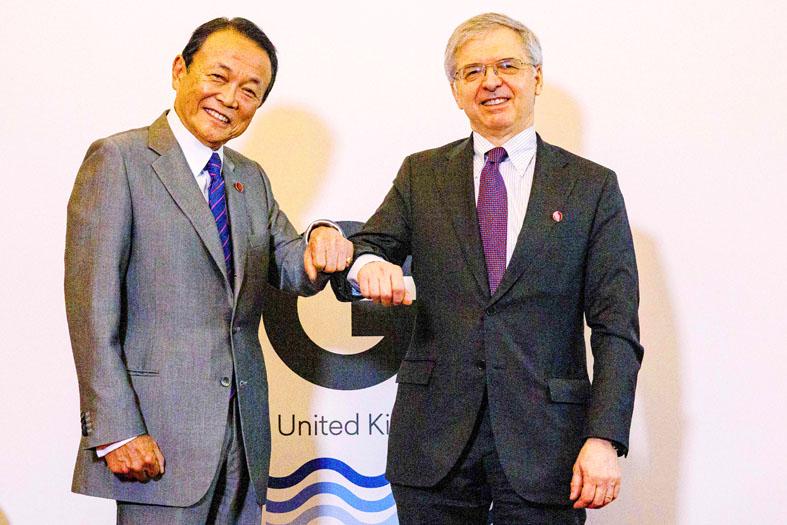Japan and the US would have to defend Taiwan together in the event of a major problem, Kyodo News reported Japanese Deputy Prime Minister Taro Aso as saying, marking some of the highest-level remarks from Tokyo on the sensitive subject.
In comments at a political fundraising party in Tokyo on Monday, Aso said an invasion of Taiwan by China could be seen as an existential threat, allowing Japan to exercise the right to collective self-defense, Kyodo reported.
Japan has sought to avoid alienating China, its biggest trading partner, while maintaining its alliance with the US amid tensions between the world’s two largest economies over topics ranging from the origins of COVID-19 to human rights.

Photo: AFP
Aso told reporters yesterday that the most desirable outcome was for the parties involved to reach a peaceful solution through direct talks.
“We have to think about various situations, such as not being able to pass through the Taiwan Strait,” Aso said. “It’s difficult to say overall which would be an existential threat.”
Japanese Chief Cabinet Secretary Katsunobu Kato told a news conference that he did not know the details of Aso’s comments on defending Taiwan and declined to comment on them.
The Ministry of Foreign Affairs yesterday said it is glad that the international community is concerned with stability in the Taiwan Strait, adding that Taiwan would continue to work with like-minded nations to maintain peace across the Taiwan Strait.
China, on the other hand, said Aso’s comments were “extremely wrong and dangerous.”
Chinese Ministry of Foreign Affairs spokesman Zhao Lijian (趙立堅) told a regular news conference in Beijing that “we will never allow any country in any way to interfere in the Taiwan question, and nobody should underestimate the Chinese people’s strong determination, will and ability to safeguard national sovereignty.”
Tensions have grown around Taiwan in the past few months, with China sending 28 military planes close to the nation last month, the largest exercise this year.
Japanese Minister of Defense Yasuhide Nakayama said in a presentation to a Washington think tank last month that China presented a growing threat and it was necessary to protect Taiwan as a “democratic country.”
Chinese officials urged Japan to disavow Nakayama’s remarks, which they described as sinister, irresponsible and dangerous.
Kato said the comments represented a personal view.
While Japan’s pacifist constitution limits the scope of its armed forces, a 2015 reinterpretation of the document allows it to send troops to overseas conflicts in some circumstances.
Additional reporting by CNA

NO HUMAN ERROR: After the incident, the Coast Guard Administration said it would obtain uncrewed aerial vehicles and vessels to boost its detection capacity Authorities would improve border control to prevent unlawful entry into Taiwan’s waters and safeguard national security, the Mainland Affairs Council (MAC) said yesterday after a Chinese man reached the nation’s coast on an inflatable boat, saying he “defected to freedom.” The man was found on a rubber boat when he was about to set foot on Taiwan at the estuary of Houkeng River (後坑溪) near Taiping Borough (太平) in New Taipei City’s Linkou District (林口), authorities said. The Coast Guard Administration’s (CGA) northern branch said it received a report at 6:30am yesterday morning from the New Taipei City Fire Department about a

IN BEIJING’S FAVOR: A China Coast Guard spokesperson said that the Chinese maritime police would continue to carry out law enforcement activities in waters it claims The Philippines withdrew its coast guard vessel from a South China Sea shoal that has recently been at the center of tensions with Beijing. BRP Teresa Magbanua “was compelled to return to port” from Sabina Shoal (Xianbin Shoal, 仙濱暗沙) due to bad weather, depleted supplies and the need to evacuate personnel requiring medical care, the Philippine Coast Guard (PCG) spokesman Jay Tarriela said yesterday in a post on X. The Philippine vessel “will be in tiptop shape to resume her mission” after it has been resupplied and repaired, Philippine Executive Secretary Lucas Bersamin, who heads the nation’s maritime council, said

REGIONAL STABILITY: Taipei thanked the Biden administration for authorizing its 16th sale of military goods and services to uphold Taiwan’s defense and safety The US Department of State has approved the sale of US$228 million of military goods and services to Taiwan, the US Department of Defense said on Monday. The state department “made a determination approving a possible Foreign Military Sale” to the Taipei Economic and Cultural Representative Office in the US for “return, repair and reshipment of spare parts and related equipment,” the defense department’s Defense Security Cooperation Agency said in a news release. Taiwan had requested the purchase of items and services which include the “return, repair and reshipment of classified and unclassified spare parts for aircraft and related equipment; US Government

More than 500 people on Saturday marched in New York in support of Taiwan’s entry to the UN, significantly more people than previous years. The march, coinciding with the ongoing 79th session of the UN General Assembly, comes close on the heels of growing international discourse regarding the meaning of UN Resolution 2758. Resolution 2758, adopted by the UN General Assembly in 1971, recognizes the People’s Republic of China (PRC) as the “only lawful representative of China.” It resulted in the Republic of China (ROC) losing its seat at the UN to the PRC. Taiwan has since been excluded from